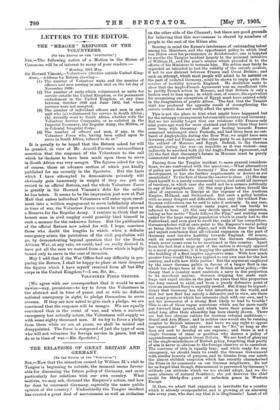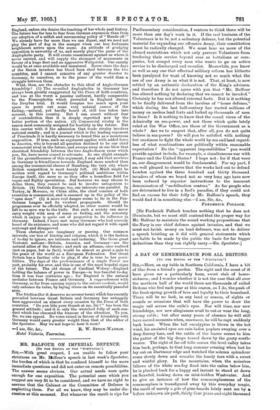THE RELATIONS OF GREAT BRITAIN AND GERMANY.
rTo THE EDITOR OF THE "SPECTATOR.")
Sin,—Now that the sensation caused by William IL's visit to Tangier is beginning to subside, the moment seems favour- able for discussing the future policy of Germany, and more particularly her relations with our own country. What motives, we may ask, dictated the Emperor's action, and bow far does he represent Germany, especially the saner public opinion of the country ? Undoubtedly the Tangier incident has created a great deal of nervousness as well as irritation on the other side of the Channel; but there are good grounds for believing that this nervousness is shared by numbers of people to the east of the Rhine also.
Bearing in mind the Kaiser's intolerance of outstanding talent among his Ministers, and the opportunist policy to which Graf von Billow owes his permanence as Reichskanzler, one is tempted to ascribe the Tangier incident largely to the personal initiative of William II., and the year's silence which preceded it to the efforts of his Ministers to restrain him. His action may fairly be regarded as intended to test the solidity of the entente cordiale, if not to sow distrust between France and Great Britain; and such an attempt, which most people will admit to be natural on the part of isolated Germany, could be shown to imply quite the reverse of hostility towards England. He doubtless seeks to show that the Anglo-French Agreement was an insufficient title to justify French action in Morocco, and that Britain is only a broken reed to lean upon; in which case, of course, the equivalent for recognising our occupation of Egypt must have existed solely in the imagination of perfide Albion. The fact that the Tangier visit has produced the opposite result of strengthening the entente cordiaie does not really affect the question.
This is not the place to hint what might have happened but for the unhappy estrangement between this country and Germany. But we too readily forget that our relations with France only nine years ago were far more strained and bitter than they have ever been with Germany. Had our feeling towards France remained unchanged since Fashoda, and had there been no out- burst of Anglophobia during the Boer War, we might have seen Germany, and not France, as the other party to an Agreement on the subject of Morocco and Egypt. Indeed, to the German attitude during the war—as impolitic as it was violent—may indirectly be ascribed both (1) the Anglo-French Agreement, and (2) the fact that Germany's future in Morocco must be purely commercial and non-political.
Passing from the Tangier incident to more general considera- tions, we are confronted with the questions,—What alternatives of policy are possible for Germany ? Has she reached her full development, or has she further requirements or desires as yet unsatisfied? To the first of these the answer is clear. (1) She may limit herself to a purely commercial career, and avoid all increase of territory, in which case she could not be a menace politically to any of her neighbours. (2) She may place before herself the ideal of expansion in Europe at the expense of the Austrian Empire, Holland, and Switzerland. But such a policy bristles with so many dangers and difficulties that only the wildest Pan- German enthusiasts can be said to take it seriously. In any case, its discussion would occupy many pages, and can barely be referred to here. (3) She may decide upon colonial expansion, taking as her motto "Trade follows the Flag," and seeking some outlet for the large surplus population which is yearly lost to the Fatherland, and even goes to swell the ranks of her competitors. Germanophobes will at once point to the Emperor's naval policy as being directed to this object, and will then draw the hasty and unjust conclusion that all colonial expansion on the part of Germany must involve hostility towards England. Of course, such an argument entirely ignores the German standpoint, which never seems even to be mentioned in this country. Apart from the fact that a large part of the nation is strongly opposed to a naval programme, it is begging the question to assume that the building of a fleet implies aggressive aims. With how much greater force would this have applied to our own case for the last century, and with how little justice ! But the argument employed by the saner German public in favour of a larger fleet is one which has always been at the base of British naval policy,—the theory that a country must maintain a navy in due proportion to its, merchant marine. German shipping has made such huge and rapid strides in the past ten years that this proportion has long ceased to exist, and from a purely defensive point of view an increased Navy is urgently needed. But it may be argued : Grant that Germany has the best intentions in the world, and that her new fleet has merely a defensive end in view, are there not many points at which her interests clash with our own, and is not her possession of a strong fleet likely to lead to trouble ? This is one of those vague assertions which are far more easily put forward than proved, and which leave their poison in the mind long after their absurdity has been clearly shown. There are but two obvious outlets for German colonial ambitions,— Brazil and Asia Minor; and in neither case would she be running counter to British interests. And have we any right to oppose her expansion? The only answer can be "No," so long as she does not seek to develop at our expense; and there is not a single German of sense or position who desires a policy of aggrandisement against Great Britain. We are fond of glorying in the single-mindedness of British policy, forgetting that purity of aim is never so obvious to the foreign observer as to ourselves. The converse of this is equally true : and while ready for any emergency, we should learn to credit the German Government with similar honesty of purpose, and to dismiss from our minds the almost childish suspicion which has recently characterised the Press in its comments on our German neighbours. Do not let us forget that though disarmament is prevented by Germany's attitude (an attitude which we too should adopt, had we the same absence of natural frontiers), she yet deserves the chief credit for thirty-five years of unbroken peace in Western Europe.
If, then, we admit that expansion is inevitable for a country which is already overpopulated, and is growing at an alarming rate every year, who dare say that it is illegitimate? Least of all
England, unless she denies the teaching of her whole past history. The future has far less to fear from German expansion than from our adoption of a selfish and unreasoning policy of "Hands off !" We already have far more than we can digest, and we need not play the part of dog in the manger when our less fortunate neighbours arrive upon the scene. An attitude of grudging opposition is unworthy of us, and merely plays' the game of the Anglophobe party. It will create resentment against us where it never existed, and will supply the strongest of arguments in favour of a huge fleet and an aggressive Weltpolitik. Our enmity would be at once avoidable and unnatural. Never since the days of the Saxon invaders has blood been shed between the two countries, and I cannot conceive of any greater disaster to Germany, to ourselves, or to the peace of the world than a struggle between them. What, then, are the obstacles to this ideal of Anglo-German friendship ? (1) The so-called Anglophobia in Germany has always been greatly exaggerated by the Press of both countries, and was at the worst a passing outburst, hardly comparable to the Francophobia which prevailed in England during the Dreyfus trial. It would trespass too much upon your space to point out some very natural causes of the feeling,—natural, yet hardly heard of, still less taken into account, in this country. But I can assert without fear of contradiction that it is deeply regretted now by the better portion of the nation. (2) Commercial rivalry is the reason most commonly assigned for hostility in the future. But this carries with it the admission that trade rivalry involves national enmity ; and in a journal which is the leading exponent of Free-trade it is hardly necessary to brand this as a monstrous supposition. If true, such an argument applies with added force to America, who is beyond all question destined to be our chief commercial rival in the future, and sweeps away at one blow that cherished friendship between the two Anglo-Saxon races which you, Sir, have never ceased to advocate. As one slight example of the groundlessness of this argument, I may add that nowhere in Germany is friendliness towards England more marked than among the commercial classes of Hamburg, the very city where British competition is most keenly felt. (3) Much might be written with regard to Germany's political ambitions within Europe itself, the more so as they offer a boundless field for vague and flighty speculation. But however we may choose to define them, they cannot be said to involve antagonism to Britain. (4) Outside Europe, too, our interests run parallel. In Turkey, in Morocco, in China alike, the chief concern of both countries is commercial, and is summed up in the policy of the "open door." (5) A more real danger seems to lie in the Pan- German League and its virulent propaganda. Should its programme ever be officially adopted, no other course would be left to us save war to the knife. But such a society can never carry weight with men of sense or feeling, and the notoriety which it enjoys is quite out of proportion to its influence in Germany. Indeed, I have met many Germans who had scarcely heard of its existence, and none who did not regard it with equal contempt and disapproval.
These obstacles are imaginary or passing. Our common interests, our ties of kinship and religion, which it is the fashion of to-day to ignore, are intimate and enduring. The three great Teutonic nations—Britain, America, and Germany—are the natural allies of the future ; and such an alliance, once realised (not on paper, but in fact), would be almost as great a gain to the peace of the world as a European Federation. But Great Britain has a further rale to play, if she is true to her possi- bilities. The days of the predominance of a single Power are past, probably for ever, and this is one of the most hopeful signs of the future. The old dream of Cardinal Wolsey—England holding the balance of power in Europe—is less fanciful to-day than it was four centuries ago ; for England is the natural mediator between France and Germany. A rapprochement with Germany, so far from causing injury to the entente cordiale, would only enhance its value, by laying stress on its essentially peaceful aims.
The friction (for it deserves no severer term) which has recently prevailed between Great Britain and Germany has unhappily been aggravated on almost every occasion by the Press of both countries. "Do you bite your thumb at me, Sir ? " has been the general attitude ; and it is only the wretched folly of such con- duct which has obscured the humour of the situation. To you, Sir, we can appeal. No voice raised in favour of friendship with Germany would carry greater weight than that of the editor of the Spectator. May we not hope to hear it soon?
Hotel Victoria, Taormina.







































 Previous page
Previous page